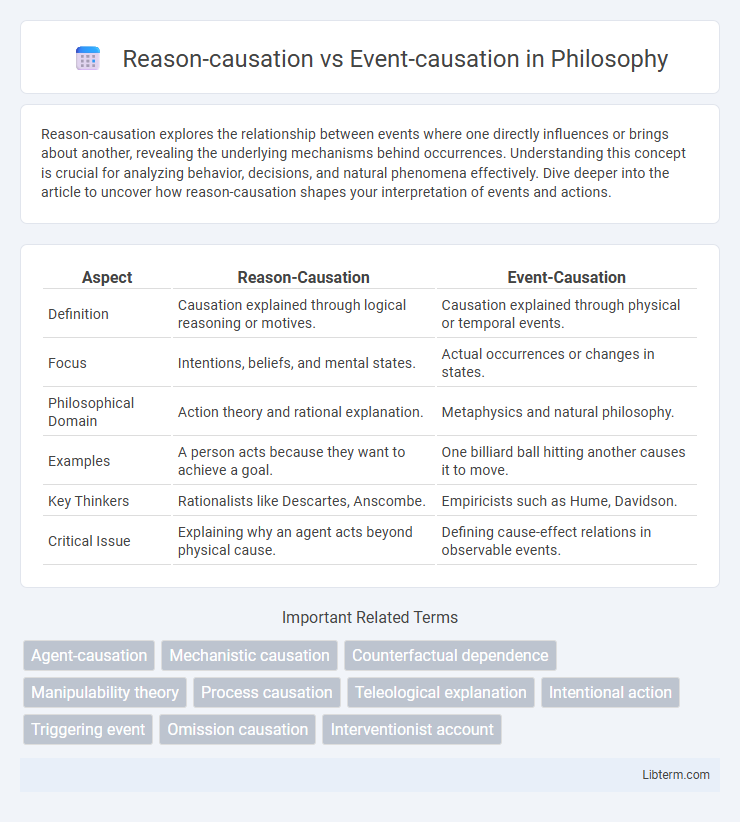Reason-causation explores the relationship between events where one directly influences or brings about another, revealing the underlying mechanisms behind occurrences. Understanding this concept is crucial for analyzing behavior, decisions, and natural phenomena effectively. Dive deeper into the article to uncover how reason-causation shapes your interpretation of events and actions.
Table of Comparison
| Aspect | Reason-Causation | Event-Causation |
|---|---|---|
| Definition | Causation explained through logical reasoning or motives. | Causation explained through physical or temporal events. |
| Focus | Intentions, beliefs, and mental states. | Actual occurrences or changes in states. |
| Philosophical Domain | Action theory and rational explanation. | Metaphysics and natural philosophy. |
| Examples | A person acts because they want to achieve a goal. | One billiard ball hitting another causes it to move. |
| Key Thinkers | Rationalists like Descartes, Anscombe. | Empiricists such as Hume, Davidson. |
| Critical Issue | Explaining why an agent acts beyond physical cause. | Defining cause-effect relations in observable events. |
Introduction to Causation: Definitions and Importance
Reason-causation refers to explaining events through motives, intentions, or purposes behind actions, whereas event-causation focuses on physical or empirical events causing other events through mechanisms or laws. Understanding the distinction is crucial in philosophy, law, and science for accurately identifying causes and explaining outcomes. Properly distinguishing these causation types enhances clarity in attributing accountability and predicting consequences in diverse disciplines.
Distinguishing Reason-Causation from Event-Causation
Reason-causation involves explaining human actions by citing agents' intentions, desires, or beliefs as causes, whereas event-causation focuses on physical or external events triggering outcomes. Distinguishing reason-causation requires identifying mental states as explanatory causes, contrasting with event-causation's emphasis on observable interactions between events. This differentiation is central in philosophy of action, highlighting how reasons provide rational justification rather than mere physical causality.
Philosophical Background of Reason-Causation
Reason-causation centers on the concept that actions are performed for reasons that serve as explanations, grounding human behavior in motivations and intentions. Rooted in Aristotelian philosophy, it distinguishes causal explanations involving mental states from purely physical event interactions. This approach emphasizes rational agency and the teleological nature of actions, contrasting with event-causation's focus on deterministic sequences of physical occurrences.
Philosophical Background of Event-Causation
Event-causation in philosophy emphasizes the relationship between distinct occurrences where one event brings about another through temporal and causal connections, contrasting with reason-causation which centers on agents' intentions and motivations. This concept traces back to Hume's analysis of causality, highlighting constant conjunction and temporal contiguity as fundamental to event linkage. Contemporary debates explore event-causation's role in providing a non-reductive account of causality that accounts for physical interactions without invoking mental states or rational explanations.
Key Differences Between Reason-Causation and Event-Causation
Reason-causation emphasizes motives or intentions behind human actions, explaining why an individual acted based on their desires or beliefs, whereas event-causation focuses on physical or natural events causing other events through a chain of cause and effect. The key difference lies in the explanatory frameworks: reason-causation deals with mental states as causes, while event-causation relies on objective occurrences and their direct consequences. Understanding this distinction is crucial in fields such as philosophy of action and metaphysics, where interpreting human behavior versus natural events requires separate causal analyses.
Role of Agency in Reason-Causation
Reason-causation emphasizes the role of rational agency, where agents cause events by acting based on intentions, beliefs, and reasons, distinguishing it from event-causation's focus on mere physical interactions between events. In reason-causation, agency is central because it attributes causality to purposeful mental states rather than just antecedent events. This framework highlights that human actions result from deliberative processes, which cannot be fully explained by the mechanistic chains emphasized in event-causation.
Mechanistic Processes in Event-Causation
Event-causation emphasizes mechanistic processes, where causality is understood through a chain of interactions linking physical events in a lawful sequence. Unlike reason-causation, which attributes outcomes to agents' intentions or reasons, event-causation explains phenomena via underlying physical mechanisms such as chemical reactions, neural impulses, or mechanical forces. This focus on mechanistic processes allows a more precise and scientifically grounded analysis of causation in natural events.
Implications for Moral Responsibility
Reason-causation emphasizes intentional mental states as the causes of actions, highlighting the role of agents' beliefs, desires, and intentions in moral responsibility. Event-causation focuses on physical or external events causing actions, which can challenge traditional notions of accountability by attributing behavior to causal chains outside conscious control. This distinction impacts legal and ethical evaluations, influencing how responsibility is assigned in cases involving coercion, automatism, or subconscious influences.
Contemporary Debates on Causation Theories
Reason-causation emphasizes agents' intentions and reasons as causes, contrasting with event-causation, which centers on prior events producing effects through natural laws. Contemporary debates highlight challenges in integrating mental states into causal explanations, questioning whether reasons can be reduced to event-causal chains or require distinct conceptual frameworks. Philosophers explore compatibility issues between reason-based explanations in actions and empirical event-causation models, influencing discussions on free will and moral responsibility.
Conclusion: Integrating Perspectives on Causation
Integrating perspectives on Reason-causation and Event-causation reveals that while Reason-causation emphasizes intentional actions driven by motives, Event-causation focuses on the sequence of events and their effects. Combining these frameworks enables a comprehensive understanding of causation that accounts for both the mental states behind actions and the observable occurrences in the physical world. This synthesis facilitates more nuanced explanations in fields such as philosophy, psychology, and legal studies by bridging subjective intentions with objective event sequences.
Reason-causation Infographic

 libterm.com
libterm.com